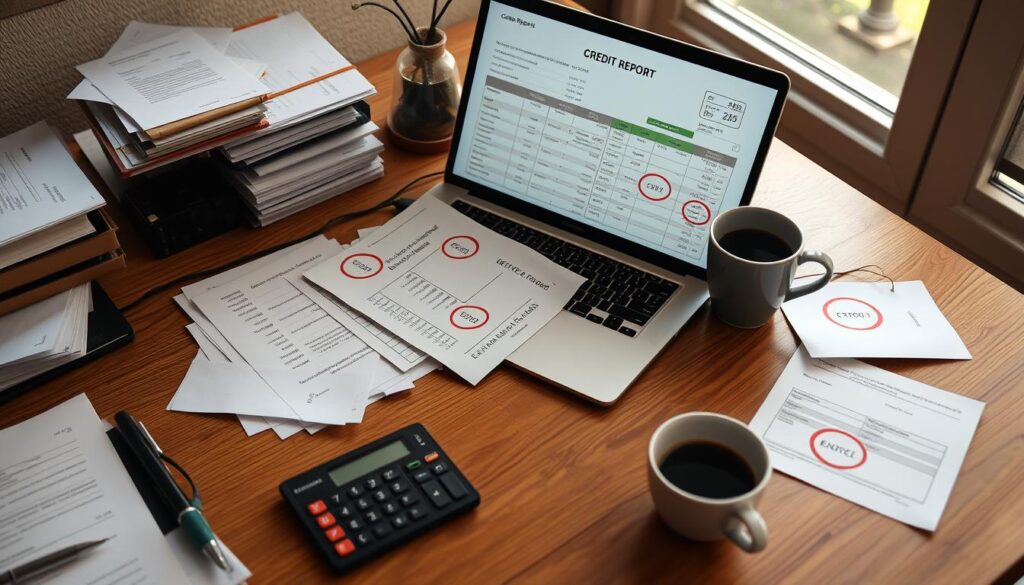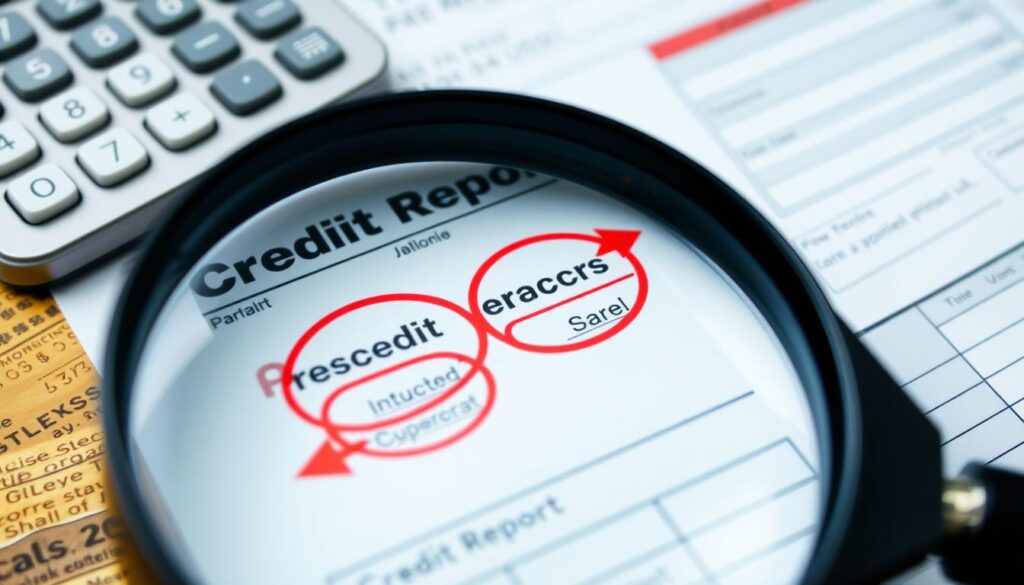Credit report errors can significantly impact your financial life, affecting your buying power, job prospects, and ability to rent or buy a home. With 44% of people having errors on their credit reports, it’s essential to understand the dispute process and its impact on your credit score. Credit bureaus like Equifax, Experian, and TransUnion sell your credit information to businesses, which use it to make decisions about you. Therefore, it’s crucial to ensure the accuracy of your credit report to maintain a healthy credit score.
Disputing credit report errors is a straightforward process that can be done online, by phone, or through mail. The credit bureaus have 30 days to investigate disputes and five business days to notify the outcome. If errors are fixed, you’ll receive an updated credit report. It’s also important to note that disputing credit report errors does not harm your credit score, but the outcome may affect it. Understanding the credit report errors and their impact on your credit score is vital to navigating the dispute process effectively.
The first step in disputing credit report errors is to obtain your free credit reports from the major bureaus. You’re entitled to free weekly credit reports from Experian, Equifax, and TransUnion. Reviewing your credit reports regularly can help you identify errors and take corrective action to protect your credit standing. By following the dispute process and understanding your rights under the Fair Credit Reporting Act, you can ensure the accuracy of your credit report and maintain a healthy credit score.
Table of Contents
Key Takeaways
- Credit report errors can affect your financial life and credit score.
- The dispute process typically takes 30 days to complete.
- You’re entitled to free weekly credit reports from major credit bureaus.
- Disputing credit report errors does not harm your credit score.
- Understanding your rights under the Fair Credit Reporting Act is crucial to navigating the dispute process.
- Regularly reviewing your credit reports can help you identify errors and take corrective action.
Understanding Credit Report Errors and Their Impact
Credit report errors can have a significant impact on an individual’s credit score and overall financial well-being. Types of credit errors can range from simple identity mistakes to more complex account reporting issues, such as incorrectly reported accounts, account balance and credit limit errors, and reinsertion of inaccurate information after it’s corrected.
Regular credit monitoring is essential to detect and dispute these errors. By reviewing their credit reports regularly, individuals can identify errors and take corrective action to prevent credit score impact. The credit bureaus have extended a program allowing individuals to check their credit report from each bureau once a week for free at AnnualCreditReport.com.
Some common types of credit errors include:
- Identity-related errors
- Incorrectly reported accounts
- Account balance and credit limit errors
- Reinsertion of inaccurate information after it’s corrected
It’s crucial to understand the credit score impact of these errors and take proactive steps to prevent them. By staying vigilant and monitoring their credit reports regularly, individuals can ensure the accuracy of their credit information and maintain a healthy credit score.
| Credit Bureau | Free Credit Reports per Year |
|---|---|
| Experian | 1 |
| Equifax | 6 (until 2026) |
| TransUnion | 1 |
Your Rights Under the Fair Credit Reporting Act
The Fair Credit Reporting Act gives consumers the right to dispute inaccurate information on their credit reports. Credit bureaus and furnishers are required to investigate disputes and correct errors. This legislation protects consumers and ensures the accuracy of credit reports, empowering them to take control of their financial information.
Consumers have the right to one free disclosure every 12 months from each nationwide credit bureau and from nationwide specialty consumer reporting agencies. They can also request their credit scores, although this may require payment in some cases. The Fair Credit Reporting Act requires consumer reporting agencies to correct or delete inaccurate information within 30 days, and negative information more than seven years old generally cannot be reported.
Some key rights under the Fair Credit Reporting Act include:
- The right to place a security freeze on their credit report to prevent unauthorized access
- The right to an initial fraud alert that lasts for one year, and an extended fraud alert for identity theft victims that lasts for seven years
- The right to seek damages from violators of the Fair Credit Reporting Act through lawsuits
For more information on credit scores and how they are affected by the Fair Credit Reporting Act, visit this resource to learn more about credit report accuracy and consumer rights.
By understanding their rights under the Fair Credit Reporting Act, consumers can take steps to protect their credit report accuracy and ensure their financial information is handled fairly and securely.
| Right | Description |
|---|---|
| Security Freeze | Prevents unauthorized access to credit report |
| Fraud Alert | Initial alert lasts 1 year, extended alert lasts 7 years for identity theft victims |
| Damage Recovery | Consumers can seek damages from violators of the Fair Credit Reporting Act |
Obtaining Your Free Credit Reports
Consumers can obtain their free credit reports from each of the three major credit bureaus once every 12 months at AnnualCreditReport.com. This service allows individuals to monitor their credit report sections and identify any potential errors or inaccuracies.
To access your free credit reports, simply visit AnnualCreditReport.com and follow the prompts to request your reports from Equifax, Experian, and TransUnion. It’s essential to review your credit report sections carefully, as errors can negatively impact your credit score.
Understanding the different sections of your credit report is crucial in identifying errors. The credit report sections typically include personal information, account information, and public records. By regularly reviewing these sections, you can catch errors early and take steps to correct them.
Creating a schedule for regular reviews of your credit report sections can help you stay on top of your credit health. By taking advantage of your free credit reports and carefully reviewing your credit report sections, you can ensure the accuracy and completeness of your credit information.
| Credit Bureau | Report Availability |
|---|---|
| Equifax | Weekly for free |
| Experian | Weekly for free |
| TransUnion | Weekly for free |
How to Identify Credit Report Errors
Regular credit report review is essential to spot potential errors that could affect your credit score. Checking your credit report can help you identify identity theft signs, such as unfamiliar accounts or incorrect personal information. It’s crucial to review your credit report regularly to ensure its accuracy and detect any potential issues early on.
When reviewing your credit report, look out for common red flags, including:
- Unfamiliar accounts or inquiries
- Incorrect personal information, such as name, address, or social security number
- Unexplained changes in credit scores
By spotting credit errors early, you can take prompt action to dispute and correct them, which can help prevent potential damage to your credit score. Remember, it’s your right to dispute any errors you find on your credit report, and doing so can help you maintain a healthy credit score.
In addition to regular review, it’s essential to understand the process of disputing credit report errors. This includes gathering evidence, submitting a dispute, and following up on the investigation. By being proactive and taking control of your credit report, you can ensure its accuracy and protect your financial well-being.
| Step | Action | Timeline |
|---|---|---|
| 1 | Review credit report | Ongoing |
| 2 | Identify errors | As needed |
| 3 | Dispute errors | Within 30 days |
| 4 | Follow up on investigation | Within 5 days of completion |
Gathering Evidence to Support Your Dispute
When disputing errors on your credit report, it’s essential to gather dispute evidence that supports your claim. This includes collecting relevant documents, such as credit report documentation, and organizing your financial records. By doing so, you’ll be able to build a strong case and increase your chances of a successful dispute.
To get started, you’ll need to gather essential documents, including:
- Identification documents, such as a driver’s license or passport
- Proof of address, such as a utility bill or lease agreement
- Bank statements and other financial records
Once you have these documents, it’s crucial to organizing financial records in a way that makes it easy to reference them. This can include creating a folder or digital file with all your relevant documents, as well as making copies of everything you send to the credit bureau.
Creating a paper trail is also vital, as it will help you keep track of all your communications with the credit bureau. This can include:
By following these steps and gathering the necessary dispute evidence, you’ll be well on your way to resolving errors on your credit report and improving your overall credit score.
How to Dispute Credit Report Errors Effectively
Disputing credit report errors is a crucial step in maintaining an accurate credit profile. With the option to file disputes online, by mail, or by phone, it’s essential to understand the process and choose the method that works best for you. The three major credit bureaus – Equifax, Experian, and TransUnion – provide credit bureau contact information to facilitate the dispute process.
When filing a dispute, you can opt for online disputes, which is often the fastest way to initiate the process. Alternatively, you can choose mail-in disputes or phone disputes, depending on your preference. Regardless of the method, it’s vital to provide accurate and thorough documentation to support your claim.
Dispute Methods
- Online disputes: convenient and fast, with most credit bureaus offering online portals for filing disputes.
- Mail-in disputes: allows for a paper trail and can be useful for those who prefer a more traditional approach.
- Phone disputes: provides an opportunity to discuss the issue directly with a representative from the credit bureau.
It’s essential to note that disputing credit report errors does not incur any charges, and you are entitled to one free credit report per year from each of the major credit bureaus. By understanding the dispute process and choosing the right method, you can effectively resolve errors on your credit report and maintain a healthy credit profile.
Writing a Compelling Dispute Letter
To effectively dispute credit report errors, it’s essential to craft a clear and concise dispute letter. A well-structured dispute letter template can help you organize your thoughts and ensure you include all necessary information. When writing your credit report dispute letter, be sure to include your complete name and address, a detailed description of each error, and supporting documentation to substantiate your claims.
Effective dispute writing involves being thorough and professional. Your letter should clearly outline the inaccuracies in your credit report and provide evidence to support your claims. You can use a dispute letter template as a guide to help you structure your letter. Remember to keep your tone professional and avoid being confrontational or aggressive.
- Your full name and address
- A detailed description of each error
- Supporting documentation, such as bank statements or receipts
- A clear statement of the desired resolution
By following these tips and using adispute letter templateas a guide, you can create an effectivecredit report dispute letterthat helps you resolve errors on your credit report. Remember to always keep a professional tone and provide thorough documentation to support your claims.
| Dispute Letter Element | Importance |
|---|---|
| Clear description of errors | High |
| Supporting documentation | High |
| Professional tone | High |
Dealing with Credit Bureaus During the Process
When disputing credit report errors, it’s essential to understand the credit bureau response time and the dispute follow-up process. Credit bureaus have 30 days to investigate disputes, and they must report the results within five days of completing the investigation. This credit investigation process can seem lengthy, but it’s crucial to ensure accuracy and fairness.
The credit bureau response time can vary, but generally, it takes 30-45 days to respond to a dispute. It’s essential to follow up on your dispute to ensure it’s being processed. You can do this by contacting the credit bureau directly or checking your online account for updates. Understanding the credit investigation process can help you navigate the system and ensure your dispute is handled efficiently.
Here are some key points to keep in mind during the dispute follow-up process:
- Credit bureaus have 30 days to investigate disputes
- They must report the results within five days of completing the investigation
- You can follow up on your dispute by contacting the credit bureau directly or checking your online account
Remember, the credit investigation process is in place to protect your rights as a consumer. Don’t hesitate to reach out to the credit bureau if you have any questions or concerns about your dispute. By understanding the credit bureau response time and the dispute follow-up process, you can ensure your credit report is accurate and up-to-date.
| Credit Bureau | Response Time | Investigation Process |
|---|---|---|
| Experian | 30-45 days | Online dispute process |
| Equifax | 30-45 days | Mail-in dispute process |
| TransUnion | 30-45 days | Phone dispute process |
What to Do If Your Dispute Is Rejected
If your dispute is rejected, don’t worry, there are still steps you can take to resolve the issue. You can ask that a statement of the dispute be included in your file and in future reports. This way, you can ensure that your side of the story is heard and that the error is not repeated in the future.
In some cases, it may be helpful to seek the assistance of credit repair professionals who can guide you through the process of credit report appeals. These professionals can help you navigate the complex process and ensure that your rights are protected.
Alternatively, you can try to resolve the issue on your own by gathering more evidence to support your claim and resubmitting your dispute. It’s essential to be persistent and not give up, even if your initial dispute is rejected. Remember, credit report appeals are an essential part of the process, and it may take some time to resolve the issue.
Here are some additional steps you can take if your dispute is rejected:
- Review your credit report carefully to ensure that all information is accurate and up-to-date.
- Gather more evidence to support your claim, such as documents or witness statements.
- Resubmit your dispute with the new evidence and a clear explanation of why you believe the information is incorrect.
- Consider seeking the assistance of credit repair professionals if you’re not sure how to proceed.
| Step | Action | Timeline |
|---|---|---|
| 1 | Review credit report | Ongoing |
| 2 | Gather evidence | As needed |
| 3 | Resubmit dispute | Within 30 days |
Remember, resolving rejected disputes can take time and effort, but it’s essential to ensure that your credit report is accurate and up-to-date. By following these steps and seeking the assistance of credit repair professionals if needed, you can ensure that your credit report is accurate and that you’re protected from potential errors.
Working Directly with Creditors
When dealing with creditor disputes, it’s essential to consider direct resolution through furnisher communication. This approach can be beneficial in resolving credit report errors efficiently. You can contact the company that provided the information to the credit bureau, also known as furnishers, to address any discrepancies.
Effective communication with furnishers is crucial in resolving creditor disputes. By working directly with creditors, you can potentially avoid lengthy and complicated processes. Furnisher communication can help you understand the root cause of the error and facilitate a direct resolution.
Some key benefits of direct resolution through furnisher communication include:
- Quicker resolution of creditor disputes
- Improved communication with furnishers
- Potential avoidance of further credit report errors
It’s essential to approach furnisher communication in a proactive and informed manner. By doing so, you can take control of your credit report accuracy and work towards a direct resolution of creditor disputes.
Remember, direct resolution through furnisher communication is a viable option for resolving creditor disputes. By understanding the process and approaching it effectively, you can work towards a more accurate and error-free credit report.
| Benefits of Direct Resolution | Description |
|---|---|
| Quicker Resolution | Direct resolution through furnisher communication can lead to faster resolution of creditor disputes |
| Improved Communication | Effective communication with furnishers can help resolve errors and prevent future discrepancies |
| Potential Avoidance of Errors | Direct resolution can help avoid further credit report errors and promote a more accurate credit report |
Maintaining Your Credit During the Dispute Process
While disputing errors on your credit report, it’s essential to maintain good credit habits to prevent further damage. This includes continuing to make regular payments on time, even on accounts that are being disputed. Credit maintenance is crucial during this process, as it demonstrates your responsibility and commitment to managing your finances effectively.
A key aspect of credit maintenance is monitoring your payment history. Ensure that you’re paying at least the minimum monthly payments on all accounts, including those in dispute. This will help prevent late payments from negatively impacting your credit score. Additionally, credit score monitoring is vital, as it allows you to track changes to your credit report and score, ensuring that errors are corrected and your credit standing is protected.
To effectively maintain your credit during the dispute process, consider the following tips:
- Continue making regular payments on all accounts
- Monitor your credit report and score regularly
- Document all communications related to the dispute
By following these tips and prioritizing credit maintenance, you can protect your credit standing and ensure a successful resolution to the dispute process. Remember to stay vigilant and continue monitoring your credit report and score, even after the dispute has been resolved, to prevent future errors from occurring.
Legal Options and Consumer Protection
When dealing with persistent credit report errors, it’s essential to understand your rights under credit report laws and the resources available to you. Consumer protection agencies play a crucial role in ensuring that credit reporting agencies comply with these laws. If you’ve exhausted all other avenues, you may need to consider legal recourse to resolve the issue.
In the United States, the Fair Credit Reporting Act (FCRA) provides consumers with the right to an accurate credit report. Credit reporting agencies are obligated to investigate all disputes, and it’s illegal for them not to do so. If you’re experiencing errors on your credit report, it’s vital to inform the credit reporting agency and provide evidence to support your claim.
Some key steps to take when disputing credit report errors include preserving evidence by making copies of all documents sent to the credit bureau and providing proof of harm caused by errors on reports. It’s also recommended to send dispute letters through certified mail to ensure documentation of communication. By understanding your rights and the resources available to you, you can take control of your credit report and ensure its accuracy.
For additional guidance, you can visit the Federal Trade Commission (FTC) website, which provides information on credit report laws and consumer protection agencies. You can also report scams, fraud, or bad business practices to the FTC by visiting ReportFraud.ftc.gov.
Conclusion: Taking Control of Your Credit Report Accuracy
Maintaining the accuracy of your credit report is crucial for your financial credit health and preventing potential identity theft. By regularly reviewing your credit reports and promptly disputing any errors, you can take control of your financial literacy and ensure your credit report management is in order.
Remember, credit reporting errors are alarmingly common, and it’s your right under the Fair Credit Reporting Act to have them investigated and corrected. Stay proactive by accessing your free credit reports and monitoring them closely throughout the year. With diligence and persistence, you can protect your credit score and safeguard your financial future.
FAQ
What are the common types of credit report errors?
Common types of credit report errors include identity mistakes, account reporting issues, and more complex errors that can negatively impact your credit score and overall creditworthiness.
How do credit report errors affect my credit score?
Credit report errors can significantly impact your credit score, making it crucial to monitor your reports regularly and dispute any inaccuracies promptly.
What are my rights under the Fair Credit Reporting Act?
The Fair Credit Reporting Act protects consumers and ensures the accuracy of credit reports, providing you with legal rights and protections when dealing with credit reporting issues.
How do I obtain my free credit reports?
You can access your free credit reports from Equifax, Experian, and TransUnion, and we’ll provide step-by-step instructions on how to do so. Understanding the different sections of your credit report is also important.
What are some common red flags to look for when reviewing my credit report?
Common red flags include unfamiliar accounts, incorrect personal information, and unexplained changes in your credit score, which could indicate potential identity theft.
What documents do I need to gather when disputing credit report errors?
You’ll need to gather and organize various essential documents to support your dispute, and we’ll provide a comprehensive list to ensure you have everything you need.
What are the different methods for disputing credit report errors?
You can dispute credit report errors through online, mail-in, and phone options, and we’ll cover the pros and cons of each method, along with current contact information for the major credit bureaus.
How do I write an effective dispute letter?
We’ll provide a template and guidance on crafting a compelling dispute letter that includes clarity, conciseness, and supporting evidence to increase the chances of a successful resolution.
What should I expect during the credit bureau investigation process?
We’ll demystify the credit bureau investigation procedures, setting realistic expectations for the timeline and guiding you on when and how to follow up on your dispute.
What should I do if my dispute is rejected?
If your dispute is rejected, we’ll explain your appeal options, when to consider seeking professional assistance, and alternative methods for resolving credit report issues.
How can I work directly with creditors to resolve credit report errors?
We’ll provide strategies for effective communication with furnishers and explain the potential benefits of this approach as an alternative to the credit bureau dispute process.
How do I maintain good credit habits during the dispute process?
It’s crucial to continue making regular payments, even on disputed accounts, while also monitoring your credit score and documenting all communications related to the dispute.
What legal options and consumer protection resources are available to me?
We’ll discuss relevant laws, consumer protection agencies, and when to consider legal action if you’re struggling with persistent credit report errors.









